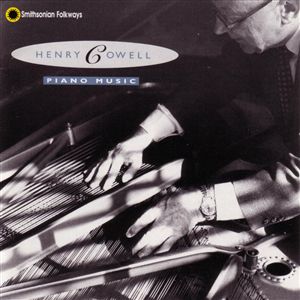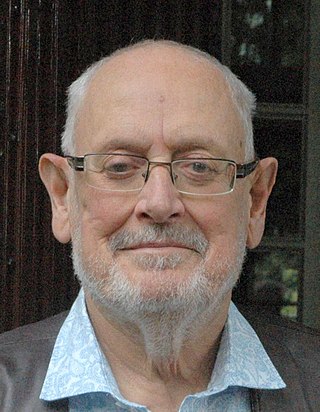Related Research Articles

Henry Dixon Cowell was an American composer, writer, pianist, publisher, teacher and the husband of Sidney Robertson Cowell. Earning a reputation as an extremely controversial performer and eccentric composer, Cowell became a leading figure of American avant-garde music for the first half of the 20th century — his writings and music serving as a great influence to similar artists at the time, including Lou Harrison, George Antheil, and John Cage, among others. He is considered one of America's most important and influential composers.

Milton Byron Babbitt was an American composer, music theorist, mathematician, and teacher. He was a Pulitzer Prize and MacArthur Fellowship recipient, recognized for his serial and electronic music.

Per Nørgård is a Danish composer and music theorist. Though his style has varied considerably throughout his career, his music has often included repeatedly evolving melodies—such as the infinity series—in the vein of Jean Sibelius, and a perspicuous focus on lyricism. Reflecting on this, the composer Julian Anderson described his style as "one of the most personal in contemporary music". Nørgård has received several awards, including the 2016 Ernst von Siemens Music Prize.
Samuel Hans Adler is an American composer, conductor, author, and professor. During the course of a professional career which ranges over six decades he has served as a faculty member at both the University of Rochester's Eastman School of Music and the Juilliard School. In addition, he is credited with founding and conducting the Seventh Army Symphony Orchestra which participated in the cultural diplomacy initiatives of the United States in Germany and throughout Europe in the aftermath of World War II. Adler's musical catalogue includes over 400 published compositions. He has been honored with several awards including Germany's Order of Merit – Officer's Cross.

String piano is a term coined by American composer-theorist Henry Cowell (1897–1965) to collectively describe pianistic extended techniques in which sound is produced by direct manipulation of the strings, instead of or in addition to striking the piano's keys. Pioneered by Cowell in the 1920s, such techniques are now often called upon in the works of avant-garde classical music composers.
Chen Yi is a Chinese-American composer of contemporary classical music and violinist. She was the first Chinese woman to receive a Master of Arts (M.A.) in music composition from the Central Conservatory of Music in Beijing. Chen was a finalist for the 2006 Pulitzer Prize for Music for her composition Si Ji, and has received awards from the Koussevistky Music Foundation and American Academy of Arts and Letters, as well as fellowships from the Guggenheim Foundation and the National Endowment for the Arts. In 2010, she was awarded an Honorary Doctorate from The New School and in 2012, she was awarded the Brock Commission from the American Choral Directors Association. She was elected to the American Academy of Arts and Letters in 2019.
John Mackey is an American composer of contemporary classical music, with an emphasis on music for wind band, as well as orchestra. For several years, he focused on music for modern dance and ballet.
Michael Blake is a South African contemporary classical music composer and performer. He studied in Johannesburg in the 1970s and was associated with conceptual art and the emergence of an indigenous experimental music aesthetic. In 1976 he embarked on 'African Journal', a series of pieces for Western instruments that drew on his studies of traditional African music and aesthetics, which continued to expand during two decades in London until he returned to South Africa in 1998. From around 2000 African music becomes less explicit on the surface of his compositions, but elements of rhythm and repetition remain as part of a more postcolonial engagement with material and form. He works in a range of styles including minimalism and collage, and now also forages for source material from the entire musical canon.
Tomás Marco Aragón is a Spanish composer and writer on music.
Johanna Magdalena Beyer was a German-American composer and pianist.
Zygmunt Krauze is a Polish composer of contemporary classical music, educator, and pianist.
David Frederick Stock was an American composer and conductor.
Gary Alan Kulesha is a Canadian composer, pianist, conductor, and educator. Since 1995, he has been Composer Advisor to the Toronto Symphony Orchestra. He has been Composer-in-Residence with the Kitchener-Waterloo Symphony (1988–1992) and the Canadian Opera Company (1993–1995). He was awarded the National Arts Centre Orchestra Composer Award in 2002. He currently teaches on the music faculty at the University of Toronto.

Rob du Bois was a Dutch composer, pianist, and jurist.
John Melby is an American composer.
Simon Steen-Andersen is a Danish composer, performer, director and media artist.

Mansoor Hosseini is an Iranian-Swedish percussionist and composer of classical music, born in Iran, who studied in Paris and Brussels. His works comprise chamber music and orchestral pieces. He founded the Ensemble Themus in Gothenburg, focussed on theatrical music.
Marvin Lee Lamb is an American composer, music pedagogue and conductor.
References
- ↑ "Nicholls, David | NMC". www.nmcrec.co.uk. Archived from the original on 28 September 2011.
- ↑ "Music | University of Southampton".
- ↑ See http://www.southampton.ac.uk/music/staff/Publications/DNichollsC.html